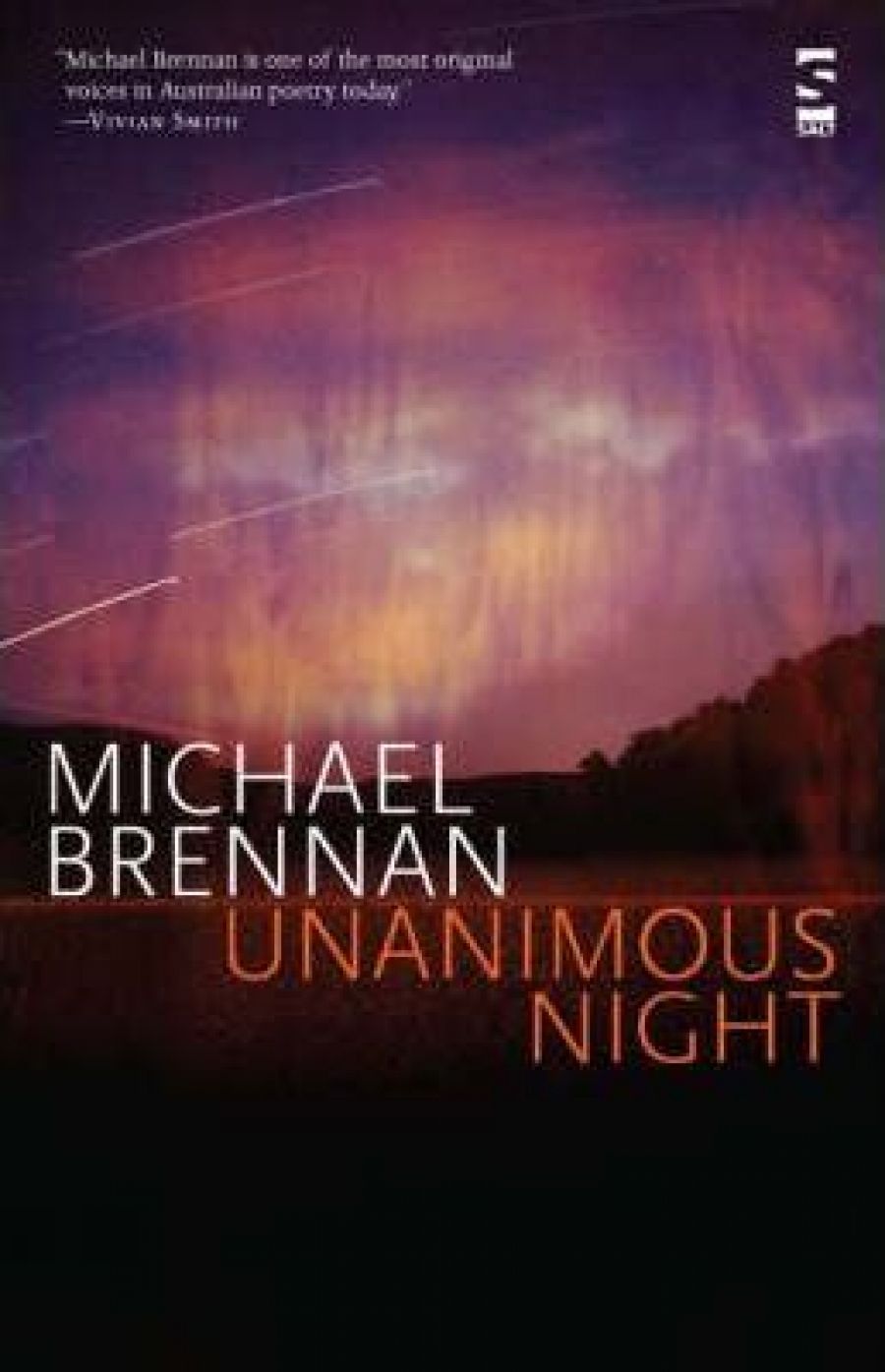
- Free Article: No
- Contents Category: Poetry
- Review Article: Yes
- Online Only: No
- Custom Highlight Text:
This book follows Michael Brennan’s brilliant début collection, The Imageless World (2003). I do not make this connection lightly; Unanimous Night shares almost everything with its predecessor: themes, methods and tone of voice. They even share the same structure: groups of shorter poems (‘Letters Home’) are punctuated by some tightly organised extended sequences.
- Book 1 Title: Unanimous Night
- Book 1 Biblio: Salt Publishing, $35 hb, 88 pp
In ‘North Country Abstracts’, the trigger seems to be the ‘thirty images my friend sent me’. The result is a group of elegant and reasonably long prose poems, far less minimalist than the stonier poems of the other sequences. The memories triggered include some of the lost brother, as well as other experiences of childhood life. Interestingly, they share with ‘Sky Was Sky’ the same spatial layout – they are horizon poems fixated on the experience of driving through open country so that sky and land unroll together. The final poem says, ‘We are vanishing points to each other’: that is, it is only the human here that defines other humans.
Brennan’s prose poems exploit the way in which that form can unwind into long, meditative sentences. The opening poem, for example, speaks of the attraction of old maps:
showing the world before it was known, showing clearly where everything we know falls apart and ends, can go no further, and so the point where everything begins ... landscapes which have perhaps already passed through us in our imagination? What is the hope that they bring but the hope of something lost and left behind? The hope of return from the various pasts inhabiting us, or the futures we wandered away from unconsciously, straying into foreign lands where we find ourselves waiting ...
The last of these art-based sequences, ‘Monologue in the Dream’, does something similar to ‘North Country Abstracts’ in that its poems begin with the works but follow their own logic. ‘Depth’ is interesting here because it allows memories to cluster round a sort of Rorschach image of red. So it begins with the propeller of a sunken warplane appearing ‘as a large and lurid / wild-flower’ moves on to the fire of a kamikaze attack on the HMAS Australia (where his grandfather was a seaman) and on to the horrors of flamethrowers as US forces push their way through the islands. Here, it is not absence that generates images but the mysteries of association.
The only one of these sequences that I don’t feel works entirely well is the title poem, ‘Unanimous Night’. I have pigeonholed it as a sequence for the sake of convenience but it is actually a slippery, long (exactly four hundred-line) meditation. At its core it is a poem built around a relationship: I can’t help but read it as an extension of the conclusion of ‘North Country Abstracts’ – that we are vanishing points to each other. In the world of the topography of sky and ground, met at the horizon, this poem seems to want to explore what relationships might be like. So it is a kind of love poem, but exactly who the protagonists are (if they have a fixed identity) is impossible to determine.
Though I think this is one failure in what is otherwise a book of brilliant poems, it does stress the sense of human relationships, and ultimately of community. You feel this as a pulse underneath Brennan’s poetry, a profound but philosophically clear-eyed belief in relationships.
My experience of reading Unanimous Night is that, in the final accounting, it is the short poems, the letters home, that catch the reader’s imagination. In a sense these are the opposite of travellers’ tales, or travellers’ despairing attempts to reconnect with a ground of normality. Everything about them is equivocal. The foreign country written home from can be almost anywhere: another country, another language, the past, the world of the poem and even, in the case of a lovely celebration of a two-year-old girl’s tottering first steps, the domestic ‘homeworld’ made strange by poetry. The first line of the first poem of Brennan’s first book establishes the situation nicely: ‘These are strange lands I barely understand.’ They make me think of Rimbaud (the second of these letters is a translation of ‘Ô saisons, Ô châteaux’), of Michaux, but also of Bruce Beaver – someone for whom the letter formed an essential poetic mode.
Much of Brennan’s signature tone comes from this series of uncertainties about where the poem is being written from and to whom. One feature is a kind of calmness that derives from someone almost bemusedly staring at a world that is consistent but not really explicable. There is no room for dramatic conclusions or a windy rhetoric.
In a way, Brennan comes closest to the minimalist poetics that the Australian poetic tradition so noticeably lacks. The usual explanation is that such traditions can only inhabit cultures where all readers share references and expectations. Brennan’s weird meta-cultural world of estranging may be a culture that all poetry readers, knowingly or otherwise, inhabit.


Comments powered by CComment